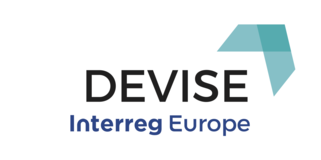The DEVISE project is arriving to the end. After having exchanged good practices and experiences, inspired each other within the partnership and developed 10 Regional Action Plans, it's time to review the changes achieved in each of the policy instruments thanks to this project. This week, we speak with Marie Moriarty, DEVISE Project Officer at Northern and Western Regional Assembly in Ireland.
What policy instrument were you addressing when the DEVISE project commenced? Why?
In the original project application, the policy instrument to be addressed was the BMW Regional Operational Programme 2014 -2020. However, due to the timing of the project it was not possible to influence or address this programme as the funds had already been committed. It was decided the interregional learnings from DEVISE project would be used to inform the development of two other policy documents, (1) the ERDF Northern and Western Regional programme 2021 – 2027 and (2) the Regional Spatial and Economic Strategy (RSES) 2020 - 2032.
What has specifically changed in your policies and your region thanks to the project?
Whilst participating in the DEVISE project, NWRA realised that digitalisation and the Digital Transformation of SMEs would play an important role in ensuring businesses in the region would remain competitive. Using the knowledge gained from the DEVISE project through the Interregional Learning process, the NWRA made at the consultation stage in the development of the Regional Spatial and Economic Strategy (RSES) 2020 – 2032 to have a number of Regional Policy Objectives (RPO) included, policy that would include supporting the digitalisation of SMEs.
As a result, the RSES now includes (In Chapter 4.4) references to ‘ICT and Digital Enterprise’ and ‘Advanced Manufacturing and Engineering’ as two additional sectors that have now been included as emerging sector and cluster that is of most importance to the region.
The Staff Exchanges also helped staff at the NWRA and stakeholders identify key technologies which will play a key role in the Digitalisation of SMEs and increasing the competitiveness of SMEs in the region. The Technologies identified are mentioned in Chapter 4 (page 181) of the strategy and states: The future of ICT in Ireland will be built around ‘third platform’ technologies, these include cloud computing, mobile devices and technologies, the Internet of Things (IoT), big data analytics, social technologies, artificial intelligence (AI), robotics, augmented reality, 3D printing and cybersecurity. Furthermore, the Regional Policy Objective 6.44 was included the RSES and states: “Encourage the adoption of digital technologies and service platforms across the region to improve asset management and service delivery”.
During the development of the ERDF programme for the Northern and Western Region 2021-2027, the NWRA as part of the DEVISE project, made submission, to the public consultation in September 2020, with recommendations to have supports for the Digital Transformation of SMEs included in the programme. These recommendations were based on the Learning outcomes from the DEVISE project.
Which good practices have inspired these changes?
Good Practices which have been used in the NWRA DEVISE Action Plan, include:
- Digital Vouchers Laval - Pays de la Loire Digital Vouchers
- DENDATICS grants programme - Fomento San Sebastian (FSS)
- Industry 4.0 Technology Audits - Regional Government of Cantabria
Would you like to highlight any other improvements?
Whilst participating in the DEVISE project, the NWRA established a Regional Stakeholder group to participate in the Interregional Learning events and to develop and implement the action plan. The stakeholder group included Government Bodies, Enterprise Support agencies, Universities and industry representatives.











